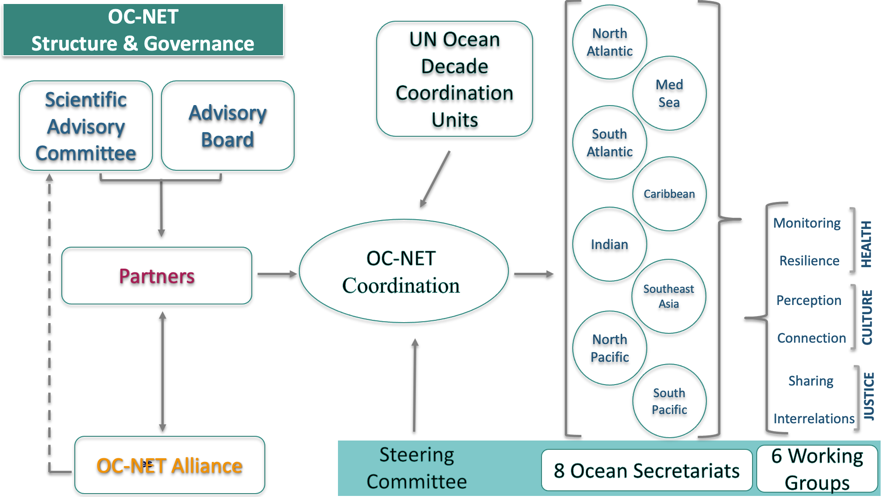Ocean secretariats
The programme entails 8 ocean secretariats to cover all the globe’s inhabited oceans (Fig. 2). Each secretariat will be in charge of expanding the regional network for a geographical region and will also be responsible for setting the regional coordinating structure. These will be done in close collaboration with all other secretariats and with the technical support of the programme coordinating office at ICM-CSIC, located in Barcelona (Spain).
The mission of the secretariats (North Atlantic, Med Sea, South Atlantic, Caribbean, Indian, Southeast Asia, North Pacific, South Pacific) consists in informing, supporting and promoting the collaboration with the local and regional actors, towards creating collaborative societal-research-managing networks that can achieve the OC-NET final goals.
This co-governance has been designed to ensure the contribution of all stakeholders including developing countries and SIDs recognized by the United Nation Conference of Rio de Janeiro (1992). Although this topic is a specific effort of the Caribbean, Pacific, Atlantic and Indian secretariats, OC-NET will pay particular attention to promoting global interaction between the different regions.

An interdisciplinary, inclusive and transformative international programme like OC-NET will rely on a wide ecosystem of actors. The actors involved are the marine research institutions, centres and institutions aimed at sustainable consumption and society development, centres and institutions for the arts and design, centres willing to raise societal awareness, the different governance administrations (particularly the city councils), business willing to increase their corporative responsibility, innovative and technological companies, NGOs, thematic and local civil associations, and all inhabitants of ocean towns and cities.
The programme will promote the involvement of marine research institutions and existing city networks committed with the SDGs, with the support of institutions interested in connecting science, art and awareness. A full local node will include a research institution, the city council, the local harbour authorities and the citizen associations (neighbour, thematic, young). OC-NET will scale up from local nodes into regional networks and finally a global assembly.
– Regional Secretariats: Coordination is facilitated through eight regional secretariats covering the largest inhabited oceanic regions: five ocean basins (North & South Atlantic, North & South Pacific, and Indian Oceans) and three semi-enclosed seas (Caribbean, Mediterranean and South-East Asia). The regional secretariats will provide coordination for regional networks and on-the-ground logistical support to the coordination of the OC-NET, and will contribute to the dissemination of the Decade Calls of Action.
– OC-NET Central Coordination: The central coordination is in charge of the overall management and monitoring of the programme. This will be done in cooperation with the UN Coordination Units, the OC-NET regional coordination centres (one per secretariat), and the working groups for all different actions (the Steering Committee). It will mainly rely on the resources detailed in this proposal. OC-NET coordination is carried out by ICM and UTM (CMIMA).

